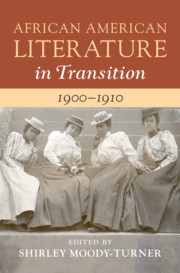Book contents
- African American Literature in Transition, 1900–1910
- African American Literature in Transition
- African American Literature in Transition, 1900–1910
- Copyright page
- Contents
- Figures
- Contributors
- Preface
- Acknowledgments
- Chronology, 1900–1910
- Introduction
- Part I Transitions in African American Authorship, Publishing, and the Visual Arts
- Part II New Negro Aesthetics and Transitions in Genre and Form
- Part III Modernist Masculinities and Transitions in Black Leadership
- Chapter 7 Charting the Tensions between Optimism and Despair at Mid-Decade
- Chapter 8 W. E. B. Du Bois and Transitions in Black Intellectual Thought
- Chapter 9 Celebrity and Transitions in Black Masculinity at the Turn of the Century
- Part IV Remapping the Turn of the Twentieth Century
- Index
Chapter 8 - W. E. B. Du Bois and Transitions in Black Intellectual Thought
from Part III - Modernist Masculinities and Transitions in Black Leadership
Published online by Cambridge University Press: 29 April 2021
- African American Literature in Transition, 1900–1910
- African American Literature in Transition
- African American Literature in Transition, 1900–1910
- Copyright page
- Contents
- Figures
- Contributors
- Preface
- Acknowledgments
- Chronology, 1900–1910
- Introduction
- Part I Transitions in African American Authorship, Publishing, and the Visual Arts
- Part II New Negro Aesthetics and Transitions in Genre and Form
- Part III Modernist Masculinities and Transitions in Black Leadership
- Chapter 7 Charting the Tensions between Optimism and Despair at Mid-Decade
- Chapter 8 W. E. B. Du Bois and Transitions in Black Intellectual Thought
- Chapter 9 Celebrity and Transitions in Black Masculinity at the Turn of the Century
- Part IV Remapping the Turn of the Twentieth Century
- Index
Summary
This chapter examines the transitions in Black intellectual thought at the turn of the century. It charts the shifts in W. E. B. Du Bois’s thinking, not in isolation, but as a member of a Black intellectual elite who were grappling with the same questions and challenges regarding the role of the Black intellectual. The chapter shows that Du Bois, Mary Church Terrell, Ida B. Wells, Anna Julia Cooper, and others saw their academic training as intimately connected with efforts to advance racial understanding and challenge the ideological bases of white supremacy. Rereading Du Bois’s pre-1900 work and the transition in his thinking that Du Bois himself attributed to the horrific lynching of Sam Hose in 1899, the chapter reveals how Du Bois’s thinking shifted over the course of the decade from a commitment to historical method and fact-finding to a more activist and militant approach that would take roots through his work on his John Brown biography, published in 1909, and eventually finding expression in the founding of the NAACP that same year.
Keywords
- Type
- Chapter
- Information
- African American Literature in Transition, 1900–1910 , pp. 199 - 221Publisher: Cambridge University PressPrint publication year: 2021

